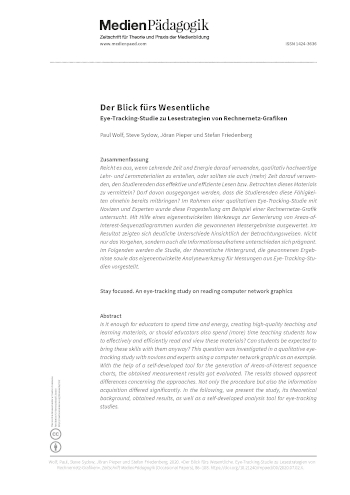Abstract
Is it enough for educators to spend time and energy, creating high-quality teaching and learning materials, or should educators also spend (more) time teaching students how to effectively and efficiently read and view these materials? Can students be expected to bring these skills with them anyway? This question was investigated in a qualitative eye-tracking study with novices and experts using a computer network graphic as an example. With the help of a self-developed tool for the generation of Areas-of-Interest sequence charts, the obtained measurement results got evaluated. The results showed apparent differences concerning the approaches. Not only the procedure but also the information acquisition differed significantly. In the following, we present the study, its theoretical background, obtained results, as well as a self-developed analysis tool for eye-tracking studies.
References
Alcock, Lara. 2016. «How do people read mathematics?» 2016. https://blog.oup.com/2016/01/reading-mathematics-proofs/.
Anderson, Lorin W., und David R. Krathwohl, Hrsg. 2001. A taxonomy for learning, teaching, and assessing: a revision of Bloom’s taxonomy of educational objectives. Complete ed. New York: Longman.
Behnke, Yvonne. 2018. «Is a Picture Worth a Thousand Words for Digital Natives? Learning-Related Challenges Presented by Pictures in Educational Media». Gehalten auf der ECER 2018, Bolzano, Italien, September 5. https://eera-ecer.de/ecer-programmes/conference/23/contribution/45011/.
Bloom, Benjamin S., Max D. Engelhart, Edward J Furst, Walker H. Hill, und David R. Krathwohl. 1956. Taxonomy of Educational Objectives: The Classification of Educational Goals. New York: David McKay.
Bock, Annekatrin, Inga Niehaus, und Maren Tribukait. 2015. «Abschlussbericht: Verwendung elektronischer Bildungsmedieninhalte in Braunschweiger Notebook-Klassen». Working Papers. Georg-Eckert-Institut - Leibniz-Institut für internationale Schulbuchforschung. http://www.edumeres.net/urn/urn:nbn:de:0220-2015-00109.
Edwards, Barbara S., und Michael B. Ward. 2004. «Surprises from mathematics education research: student (mis)use of mathematical definitions». Amer. Math. Monthly 111: 411–24.
European Commission, Directorate-General for the Information Society and Media, European Schoolnet, und Université de Liège. 2013. Survey of Schools: ICT in Education : Benchmarking Access, Use and Attitudes to Technology in Europe’s Schools. Luxembourg: Publications Office. http://dx.publications.europa.eu/10.2759/94499.
Geary, David C. 2007. «An Evolutionary Perspective on Learning Disability in Mathematics». Developmental Neuropsychology 32 (1): 471–519. https://doi.org/10.1080/87565640701360924.
Gerjets, Peter, Katharina Scheiter, und Gabriele Cierniak. 2009. «The Scientific Value of Cognitive Load Theory: A Research Agenda Based on the Structuralist View of Theories». Educational Psychology Review 21 (1): 43–54. https://doi.org/10.1007/s10648-008-9096-1.
Hubbard, Ruth. 1990. «Teaching mathematics reading and study skills». International Journal of Mathematical Education in Science and Technology 21: 265–69.
Kirschner, Paul A., John Sweller, und Richard E. Clark. 2006. «Why Minimal Guidance During Instruction Does Not Work: An Analysis of the Failure of Constructivist, Discovery, Problem-Based, Experiential, and Inquiry-Based Teaching». Educational Psychologist 41 (2): 75–86. https://doi.org/10.1207/s15326985ep4102_1.
Krathwohl, David R. 2002. «A Revision of Bloom’s Taxonomy: An Overview». Theory Into Practice 41 (4): 212–18. https://doi.org/10.1207/s15430421tip4104_2.
Levenshtein, Vladimir I. 1966. «Binary Codes Capable of Correcting Deletions, Insertions and Reversals». Soviet Physics Doklady 10: 707–10.
Mason, Lucia, Maria Caterina Tornatora, und Patrik Pluchino. 2015. «Integrative Processing of Verbal and Graphical Information during Re-Reading Predicts Learning from Illustrated Text: An Eye-Movement Study». Reading and Writing 28 (6): 851–72. https://doi.org/10.1007/s11145-015-9552-5.
Merriënboer, Jeroen J. G. van, und John Sweller. 2005. «Cognitive Load Theory and Complex Learning: Recent Developments and Future Directions». Educational Psychology Review 17 (2): 147–77. https://doi.org/10.1007/s10648-005-3951-0.
Österholm, Magnus. 2008. «Do students need to learn how to use their mathematics textbooks? The case of reading comprehension». Nordic Studies in Mathematics Education 13: 53–73.
Paas, Fred, Alexander Renkl, und John Sweller. 2004. «Cognitive Load Theory: Instructional Implications of the Interaction between Information Structures and Cognitive Architecture». Instructional Science 32 (1/2): 1–8. https://doi.org/10.1023/B:TRUC.0000021806.17516.d0.
Paas, Fred, und John Sweller. 2014. «Implications of Cognitive Load Theory for Multimedia Learning». In The Cambridge Handbook of Multimedia Learning, herausgegeben von Richard Mayer, 2. Aufl., 27–42. Cambridge: Cambridge University Press. https://doi.org/10.1017/CBO9781139547369.004.
Panse, Anja, und Walther Paravicini. 2016. «Leseverhalten und Rationalität von Studienanfängerinnen und -anfängern». Gesellschaft für Didaktik der Mathematik. https://doi.org/10.17877/de290r-17641.
Schnotz, Wolfgang, Christoph Mengelkamp, Christiane Baadte, und Georg Hauck. 2014. «Focus of Attention and Choice of Text Modality in Multimedia Learning». European Journal of Psychology of Education 29 (3): 483–501. https://doi.org/10.1007/s10212-013-0209-y.
Shepherd, Mary D., Annie Selden, und John Selden. 2009. «Difficulties First-year University Students Have in Reading Their Mathematics Text-books». Technical Report. Tennessee Technological University.
Strohmaier, Anselm R., Konstantina Tatsidou, und Kristina M. Reiss. 2018. «Eye Movements during the Reading of Word Problems. Advances in the Use of Eye Tracking Data». Gesellschaft Für Didaktik Der Mathematik, 1759–62. https://doi.org/10.17877/de290r-19712.
Sweller, John. 1988. «Cognitive Load During Problem Solving: Effects on Learning». Cognitive Science 12 (2): 257–85. https://doi.org/10.1207/s15516709cog1202_4.
Sweller, John, und Paul Chandler. 1991. «Evidence for Cognitive Load Theory». Cognition and Instruction 8 (4): 351–62. https://doi.org/10.1207/s1532690xci0804_5.
Sweller, John, Paul A. Kirschner, und Richard E. Clark. 2007. «Why Minimally Guided Teaching Techniques Do Not Work: A Reply to Commentaries». Educational Psychologist 42 (2): 115–21. https://doi.org/10.1080/00461520701263426.
Sweller, John, Jeroen J. G. van Merrienboer, und Fred G. W. C. Paas. 1998. «Cognitive Architecture and Instructional Design». Educational Psychology Review 10 (3): 251–96. https://doi.org/10.1023/A:1022193728205.
Sydow, Steve. 2018. «Erhebung und Auswertung von Eye-Tracking-Daten im Rahmen einer hochschuldi-daktischen Studie zur Vorlesung ‹Rechnernetze›». Hochschule Stralsund. https://www.hochschule-stralsund.de/fileadmin/hs-stralsund/HoDiMa/Paper/Bachelorarbeit-Sydow.pdf.
Sydow, Steve, und Paul Wolf. 2020. AOIanalyseR v1.0.0. https://doi.org/10.5281/ZENODO.3635895.
Weber, Wibke. 2018. «Multidisziplinäre Forschungsperspektiven auf Infografiken und Datenvisualisierungen». In Handbuch Visuelle Kommunikationsforschung, herausgegeben von Katharina Lobinger, 1–25. Wiesbaden: Springer Fachmedien Wiesbaden. https://doi.org/10.1007/978-3-658-06738-0_38-1.
Weinberg, Aaron, Emilie Wiesner, Bret Benesh, und Timothy Boester. 2012. «Undergraduate Students’ Self-Reported Use of Mathematics Textbooks». PRIMUS 22 (2): 152–75. https://doi.org/10.1080/10511970.2010.509336.
Wolf, Paul, und Stefan Friedenberg. 2018. «Wer lesen kann, ist klar im Vorteil – Über die Problematik und Lösungsansätze zum Lesen und Verstehen mathematischer Texte im Studium». Gesellschaft für Didaktik der Mathematik, 2027–30. https://doi.org/10.17877/de290r-19793.

